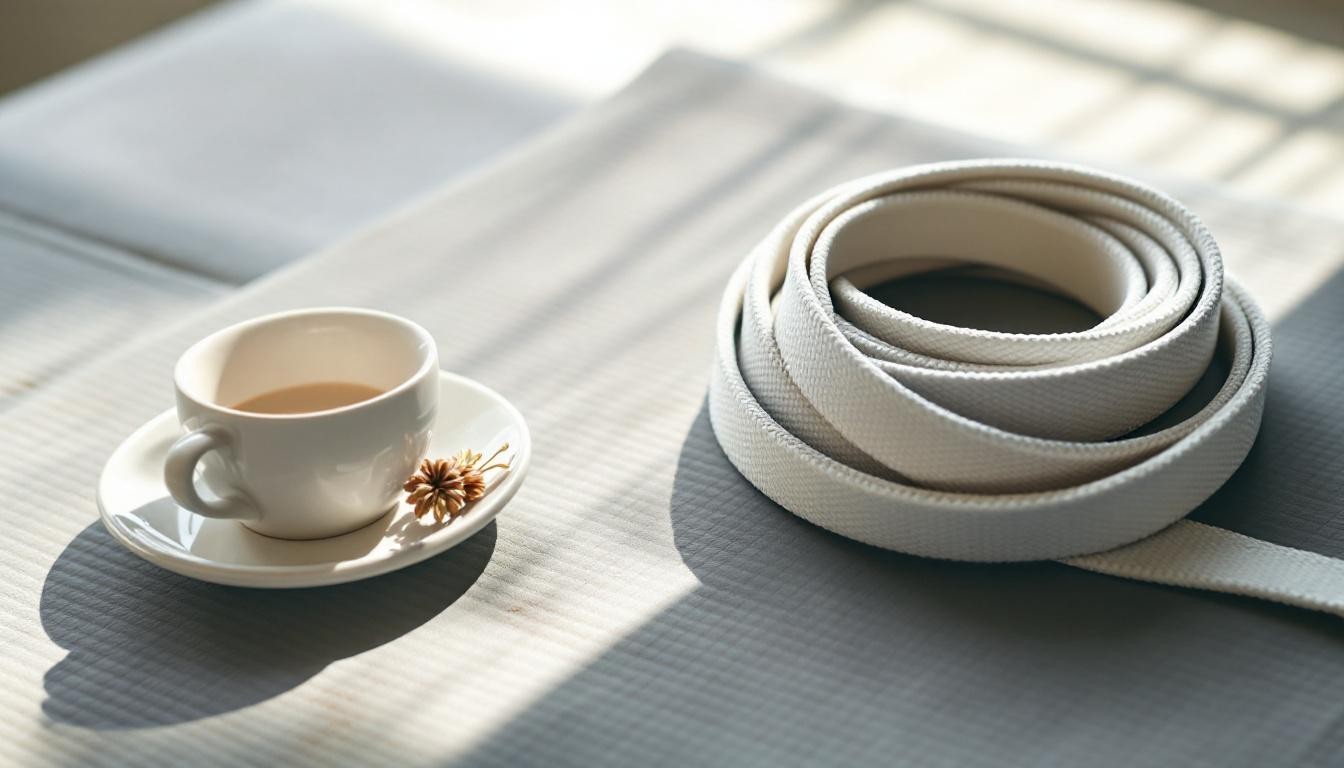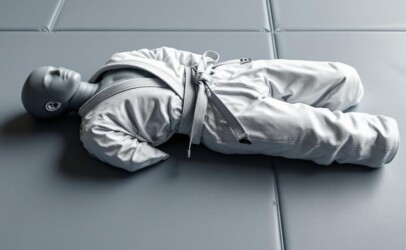At Jiu Jitsu, we believe in empowering young learners through martial arts. Jiu Jitsu for kids offers a unique blend of physical, mental, and social benefits that can shape a child’s development in profound ways.
Our martial art goes beyond just self-defense techniques; it’s a comprehensive system that nurtures well-rounded individuals. In this post, we’ll explore why Jiu Jitsu is an excellent choice for young practitioners and how it can positively impact their lives.
How Jiu-Jitsu Transforms Young Bodies
Jiu-Jitsu acts as a powerhouse for physical development in young learners. This martial art reshapes children’s bodies and abilities in remarkable ways.
Strength and Flexibility Enhancement
Engaging in intensive Jiu-Jitsu workouts fosters the development of muscle endurance in children. Through repetitive movements and sustained exercises, young practitioners often experience significant improvements in core strength (a cornerstone of overall physical health). The constant grappling and ground work in Jiu-Jitsu naturally increases flexibility, particularly in the hips and shoulders.
Balance and Coordination Mastery
The dynamic nature of Jiu-Jitsu challenges a child’s sense of balance and spatial awareness. As children learn to execute techniques, they develop exceptional proprioception – the awareness of their body’s position in space. This improved body awareness translates to better coordination in daily activities and other sports.
Cardiovascular Health Boost
Jiu-Jitsu training provides an excellent form of cardiovascular exercise. A typical class involves high-intensity intervals that push the heart and lungs, which improves overall endurance. The American Heart Association recommends that children get at least 60 minutes of moderate to vigorous physical activity daily (a requirement easily fulfilled by Jiu-Jitsu classes).
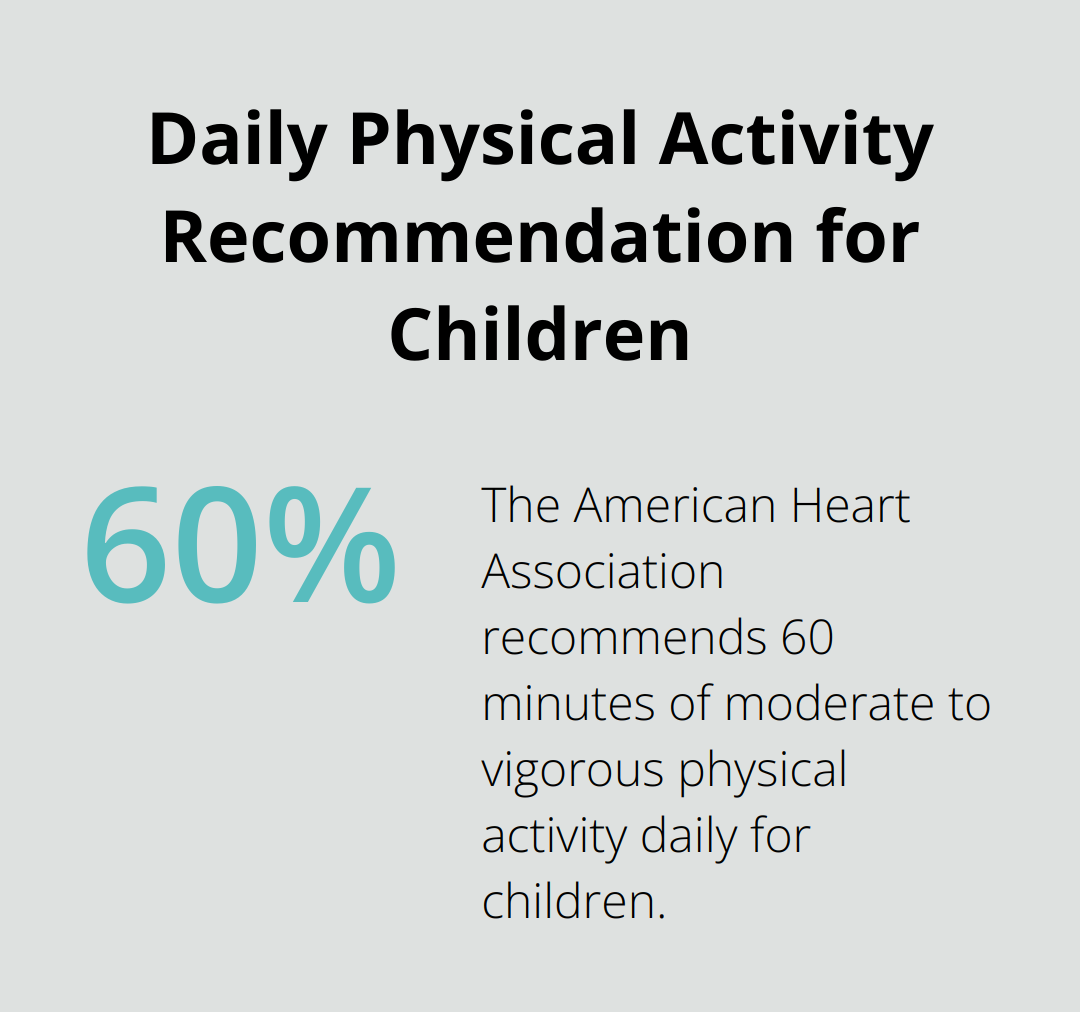
Studies show that martial arts training, including Jiu-Jitsu, leads to significant improvements in children’s physical fitness. A systematic review published in the Journal of Sports Sciences found that martial arts practice enhanced various aspects of physical fitness in young participants, including muscular strength, flexibility, and cardiorespiratory endurance.
Expert trainers guide children through age-appropriate exercises and techniques that challenge their bodies safely and effectively. Parents often notice improvements in their children’s physical capabilities within just a few months of consistent training.
The physical benefits of Jiu-Jitsu lay a strong foundation for children’s overall development. However, the advantages of this martial art extend far beyond the physical realm. The next section will explore how Jiu-Jitsu nurtures mental and emotional growth in young practitioners.
Shaping Minds and Emotions Through Martial Arts
Unshakeable Confidence
Martial arts training instills a deep-seated confidence in young practitioners. As children master techniques and overcome challenges, they experience tangible progress. This sense of achievement translates into increased self-esteem and a can-do attitude that permeates all aspects of their lives.
A study published in the Journal of Adolescent Health found that children who regularly practiced martial arts showed significantly higher levels of self-confidence compared to their peers. This boost in self-assurance often leads to improved academic performance and social interactions.
Iron-Clad Discipline
The structured nature of martial arts training demands discipline and focus. Young learners quickly understand that progress comes through consistent effort and attention to detail. This disciplined approach often carries over into their academic pursuits and personal lives.
Dr. Jennifer Baumgartner, a clinical psychologist, notes that martial arts training helps children develop better impulse control and attention span. These skills are crucial for success in school and later in life.
Strategic Thinking
Martial arts (especially Jiu-Jitsu) require practitioners to think several moves ahead, anticipate their opponent’s actions, and formulate effective strategies on the fly. This constant mental engagement hones problem-solving skills and encourages creative thinking.
Research conducted at the University of South Carolina revealed that children who participated in martial arts showed improved cognitive function, particularly in areas related to problem-solving and decision-making.
Emotional Resilience
Martial arts training teaches children how to handle setbacks and failures. They learn to view challenges as opportunities for growth rather than insurmountable obstacles. This resilience helps them navigate life’s ups and downs with greater ease.
A study in the Journal of Emotional Intelligence found that children who practiced martial arts for at least six months showed an increase in emotional regulation skills compared to their non-practicing peers.
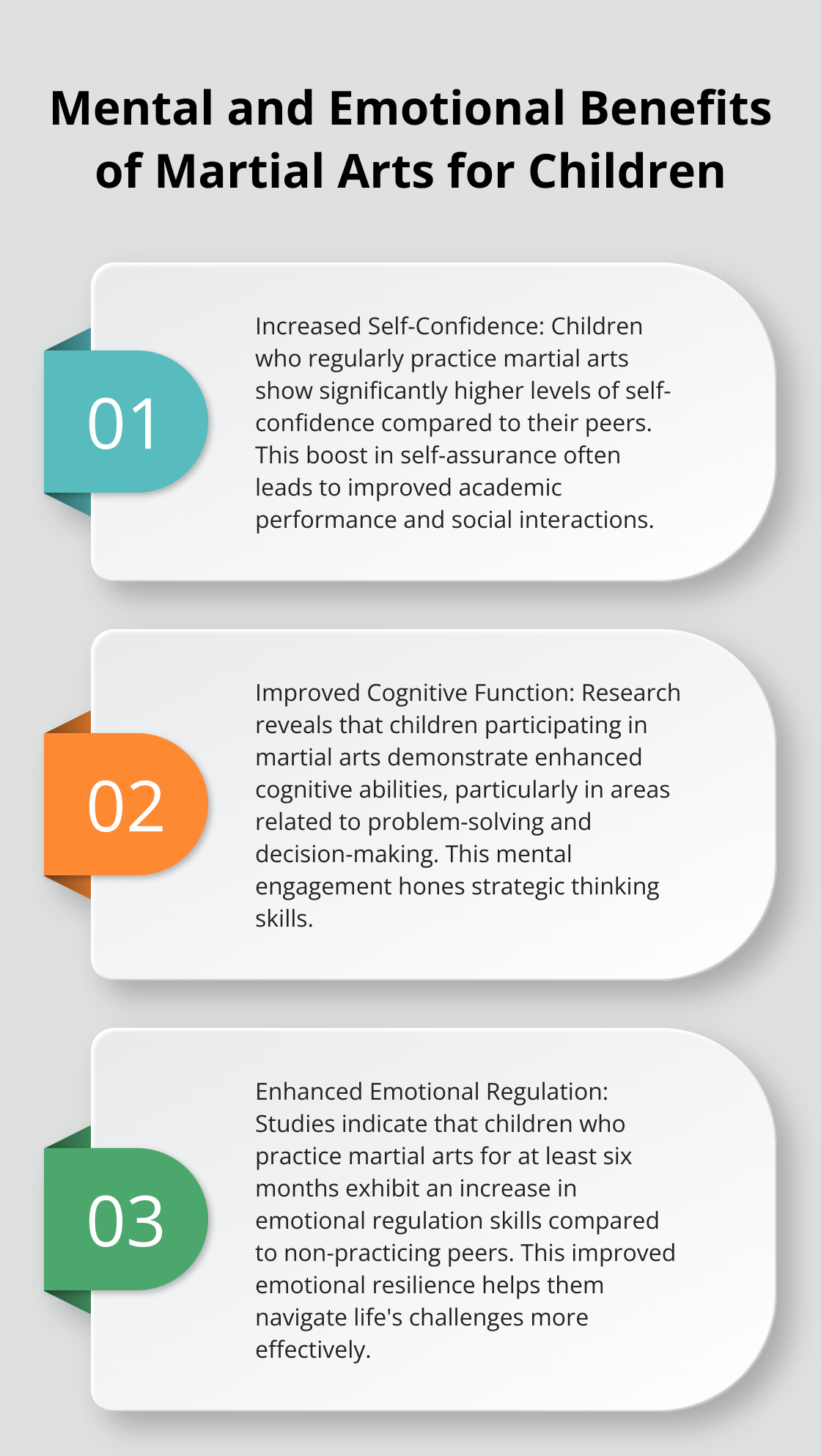
The mental and emotional benefits of martial arts complement the physical advantages, creating a holistic approach to child development. These skills not only enhance a child’s performance on the mat but also in the classroom and beyond. As we explore the next section, we’ll see how martial arts foster crucial social skills and life lessons that further contribute to a child’s overall growth and development.
Building Character Through Martial Arts
At Souza Grappling Co., we observe how martial arts training molds young learners into well-rounded individuals. Our programs extend beyond physical techniques and instill valuable life skills that benefit children well into adulthood.
Respect and Empathy
Martial arts training emphasizes respect for instructors, peers, and oneself. In our classes, children learn to bow to their instructors and training partners (a simple yet powerful gesture that reinforces the importance of mutual respect). This practice influences how children interact with teachers, parents, and peers in their daily lives.
Teamwork and Leadership
While martial arts often focus on individual growth, many aspects of training require collaboration. Partner drills and group exercises teach children the value of teamwork and cooperation. As students progress, they often take on leadership roles, help newer students, and lead warm-ups.
Conflict Resolution
Contrary to popular belief, martial arts training actually reduces aggressive behavior in children. We teach students to use their skills as a last resort, emphasizing non-violent conflict resolution techniques.
Character Development
Martial arts training provides a great opportunity for kids to build positive self-esteem and find community. It equips children with essential life skills that will serve them well in all aspects of their lives. The discipline, respect, and self-control learned on the mat often translate into improved behavior at home and in school.
Personal Growth
Through consistent training, children learn the value of perseverance and hard work. They set goals (such as achieving new belt ranks) and work diligently to accomplish them. This process of setting and achieving goals builds confidence and self-esteem, which can positively impact other areas of their lives.
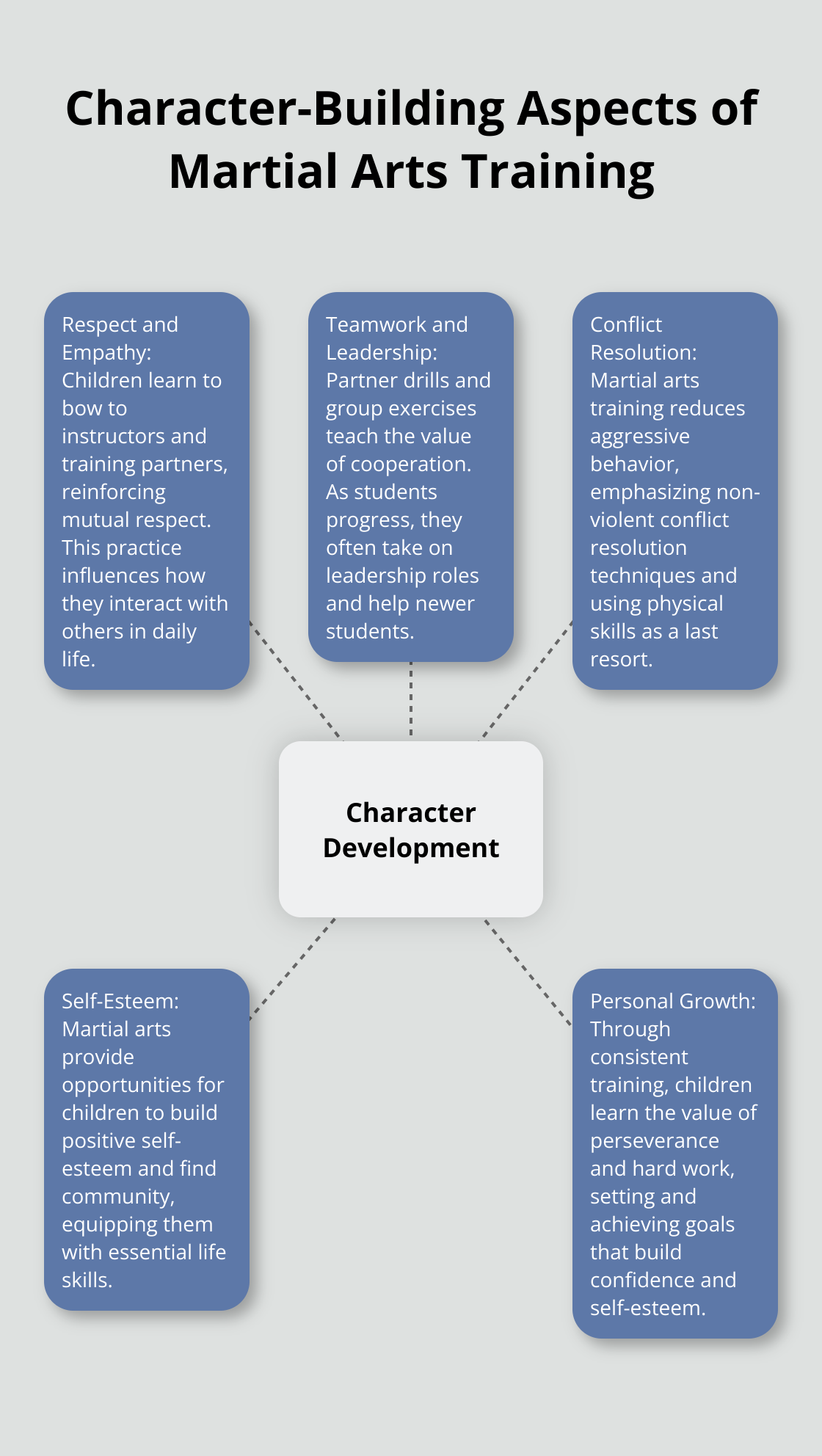
Final Thoughts
Jiu Jitsu for kids offers a transformative journey that shapes young learners physically, mentally, and socially. Children develop unshakeable confidence, discipline, and strategic thinking skills through consistent practice. They learn to navigate challenges with resilience, setting them up for success in all areas of life.
Jiu Jitsu instills respect, empathy, teamwork, and leadership in young practitioners. They learn to resolve conflicts peacefully and develop a strong moral compass that guides them through life’s complexities. The skills and values acquired through training create a ripple effect, positively influencing academic performance, social relationships, and future career prospects.
We at Souza Grappling Co. encourage parents to consider Jiu Jitsu for their children. Our comprehensive martial arts programs provide a safe, supportive environment where young learners can thrive. Investing in Jiu Jitsu training is investing in your child’s future (it’s more than just a martial art).

